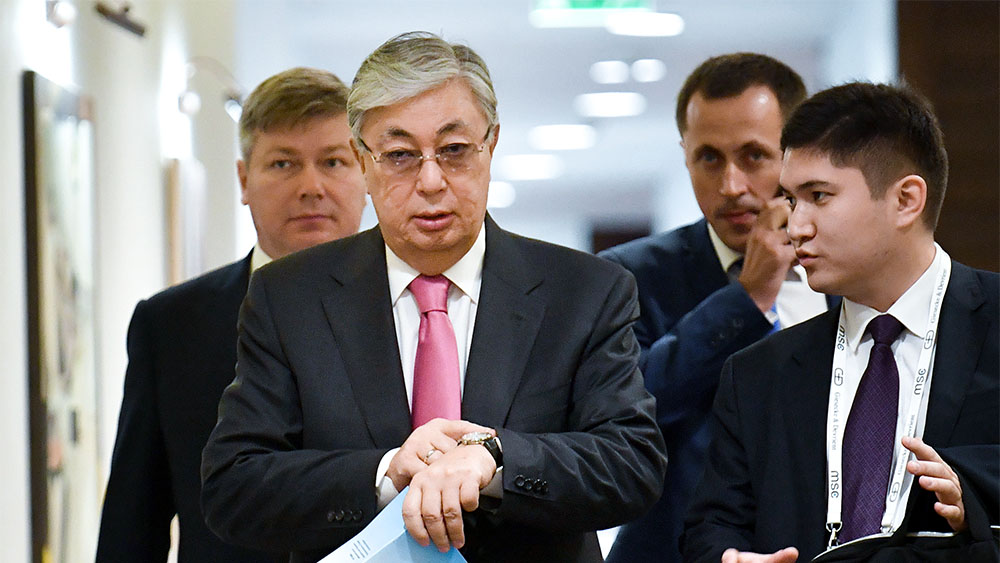Kazakhstan’s recently sworn-in president, Kassym-Jomart Tokayev, has called for an early election, to be held on June 9 and ahead of schedule. Tokayev made the announcement in an address published to the official website of the Kazakhstani president on Tuesday.
The announcement comes less than a month after the 78-year-old Nursultan Nazarbayev unexpectedly announced his resignation in a televised address, nearly 30 years after taking office after the USSR collapsed and he assumed the role of president of an independent Kazakhstan. As Chairman of the Senate, Tokayev became Kazakhstan’s acting president following Nazarbayev’s resignation on March 19. He could hold the presidency until the general election, which was supposed to take place in 2020.
“In order to ensure social and political consent, move forward confidently, and solve socio-economic development issues, we need to get rid of any uncertainty,” Tokayev said following the announcement, referencing his status as an interim president.
“The situation in the world is changing rapidly and for us it is far from the best. We must confirm the continuity, predictability and stability of our domestic and foreign policy.”
Meanwhile, Tokayev did not mention whether he is going to stand as a candidate in the upcoming presidential race. Andrey Chebotarev, a political analyst based in Kazakhstan, believes the incumbent president is likely going to run.
“For the authorities, of course, it is very important to secure the legitimate stay of Kassym-Jomart Tokayev at his position. Most likely, he will run for president unless there are any unexpected surprises,” he told Sputnik on Tuesday.
Before announcing snap election, Tokayev met with the leaders of the ruling party, Nur Otan; the Ak Zhol Democratic Party; and those from the People’s Democratic Patriotic Party Auyl.
“Probably all three of them or at least their representatives will be alternative candidates to run for president,” Chebotarev added.
Nazarbayev’s elected successor is rumored to possibly be Karim Masimov, who heads the National Security Committee; Nazarbayev’s nephew Samat Abish; and the eldest daughter of the former president and speaker of the Senate, Dariga Nazarbayeva.
Following Tokayev’s appointment as Kazakhstan’s president, Dariga Nazarbayeva was elected as a chairperson of the Senate. She previously served as a deputy prime minister. Meanwhile, Nazarbayeva’s assistant said Tuesday that she does not plan to run for president.
A general presidential election in Kazakhstan takes place once every five years on the first Sunday of December and cannot coincide with the elections of the new parliament. A snap presidential election can be set by a current head of state and is held within two months from the date of the appointment.
According to Kazakhstani legislation, no person shall be elected to the office of the president more than twice. That restriction, however, did not apply to the first president, Nursultan Nazarbayev, after whom the capital of Kazakhstan was renamed and Astana is now known as Nur-Sultan.
After the dissolution of the Soviet Union in December 1991, Nazarbayev, who had served as First Secretary of the Communist Party of the Kazakh SSR in 1989, remained in power. Since 1991, Nazarbayev has been re-elected to the office four times: in 1999, 2005, 2011 and 2015. In 1995, Kazakhstanis took part in a referendum to ratify his proposal to skip the scheduled 1996 presidential election and allow him to remain in office until 2000. Seven years later, parliament passed legislation to remove term limits.
Meanwhile, Nazarbayev will continue as leader of the ruling Nur Otan party that dominates parliament and will remain in his lifelong position as the chairman of the Security Council. In addition, he will retain the title of “Leader of the Nation,” which was bestowed upon him in 2010.
While many herald the recent events as a new chapter in Kazakhstan’s short history, others believe that Nazarbayev will still control the levers of power.
“Nazarbayev will be the one behind the curtain and can substantially correct the political processes taking place in Kazakhstan if needed,” says Azhdar Kurtov, the editor-in-chief at the Russian Institute For Strategic Studies.







 Azerbaijan and Armenia started the process of demarcation of their border on Tuesday, with the installation of the first border markers based on ge...
Azerbaijan and Armenia started the process of demarcation of their border on Tuesday, with the installation of the first border markers based on ge...
 President Aliyev emphasized the critical role of the North-South Transport Corridor in fostering transport cooperation between Azerbaijan and Russi...
President Aliyev emphasized the critical role of the North-South Transport Corridor in fostering transport cooperation between Azerbaijan and Russi...
 Armenian sappers commenced on Monday mine-clearance operations in the territories adjacent to the Saint Mary Church in village of Voskepar (Armenia...
Armenian sappers commenced on Monday mine-clearance operations in the territories adjacent to the Saint Mary Church in village of Voskepar (Armenia...
 Russian Foreign Minister Sergei Lavrov has reasserted that Moscow has no intentions to stop the fighting in Ukraine, even if peace talks commence.
Russian Foreign Minister Sergei Lavrov has reasserted that Moscow has no intentions to stop the fighting in Ukraine, even if peace talks commence.
 Iran has refuted reports of alleged damage to Shimon Peres Negev Nuclear Research Centre located southeast of Dimona, Israel, during the recent air...
Iran has refuted reports of alleged damage to Shimon Peres Negev Nuclear Research Centre located southeast of Dimona, Israel, during the recent air...
 Iran and Pakistan have signed eight cooperation documents in various fields, and agreed to strengthen ties to fight terrorism in the region.
Iran and Pakistan have signed eight cooperation documents in various fields, and agreed to strengthen ties to fight terrorism in the region.



